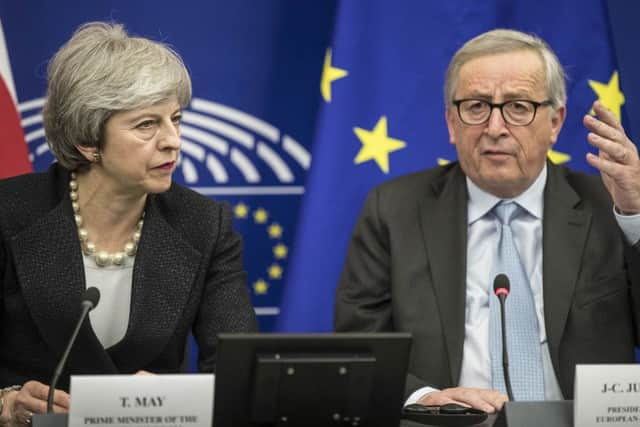Brexit: This united kingdom is as good as gone – Bill Jamieson
A colossal failure of statecraft; a collapse of trust between voters and parliament; a desperate and divided government split all the way up to the Cabinet: Brexit has proved an epic shambles and by far the worst political crisis in 70 years.
How we get through the next two days may be the pressing issue now. But there is another storm building up behind and closing quickly. It looks set to dwarf the Brexit chaos already endured: how can a divided kingdom recover – if at all?
Advertisement
Hide AdAdvertisement
Hide AdThere is barely a person I have turned to for advice over the past week who has not expressed exasperation over the Government’s handling of Brexit. Distrust is now curdling into contempt. Now, with Commons Speaker John Bercow barring Theresa May’s plan for a third vote on her Withdrawal deal, she is left begging Brussels for a Brexit extension till 30 June – the hundred times repeated deadline of 29 March now abandoned.


“But extension for what?” asks EU chief negotiator Michel Barnier. He has made clear the Withdrawal Agreement is not up for negotiation. So if it is to be a short delay, what is likely to change materially to allow Mrs May to present her deal to the Commons for a third time? As for the alternative of a long delay of up to two years, this would trigger UK participation in elections to the European Parliament – a prospect neither side favours.
So, ‘no deal’ Brexit by default? But parliament has voted against ‘no deal’. All it would require is a statutory instrument to give this vote the force of law. But under a ruling won by Remain-supporting legal campaigner Gina Miller (how ironic this is), a Statutory Instrument or clerical procedure is not sufficient to overturn the law: prerogative powers cannot be used to commit the country to new financial liabilities that would be incurred by an extension of even a few days. So an Act of Parliament is required. But in eight days?
Voters look on with barely concealed stupefaction. There is now little over a week to go but still no clarity whatever as to how and when we exit the EU – if we exit at all – and on what agreed terms – if any.
It is an astonishing parliamentary failure. And even if a miraculous last-minute ‘deal’ of sorts is reached, do we really imagine politics across the UK will revert to status quo ante?
Many in Scotland who voted ‘Remain’ may look on all this with a grim detachment and some schadenfreude. But this is to risk under-estimating the depths of bitterness and exasperation many south of the border are now feeling. All those parliamentary votes and amendments, the results broadcast live on television like some extra-time UEFA championship penalty shoot-out – and for good measure even the referee rushing forward to hoof the ball through the goalie’s legs – are seen as antics of Commons Remainers to frustrate the referendum result. It has sapped the trust of voters, driven the Labour Party into incoherence, reduced the Conservatives to feuding, irreconcilable factions and breathed fresh impetus into the sails of campaigners urging a second vote on Scottish independence.
The Government’s disastrous handling of Brexit and the Commons chaos have tested public confidence in parliament to breaking point. There is an argument that, if the Prime Minister’s deal somehow passes through parliament her position may be secure, at least for a while. Conservative MPs may then experience what one senior player is reported to have called a “sugar rush” – a brief sense of relief, well-being and confidence. Mrs May could try to dig in. The Conservative Parliamentary Party will have little motive to remove her, since a leadership election would be impracticable if the negotiation is up against a new spring deadline.
But it is hard to see how such a divided Cabinet and Government can long survive. The view also assumes MPs will happily lap up the festering plate of congealed goulash they have already rejected twice. An election now looks likely by the year-end. For all that the remnants of the Government would wish this to be a healing affair, it will be an opportunity, after almost three years of bottled-up rage, for some savage score-settling and blood-letting, particularly in constituencies that voted ‘Leave’. A united kingdom? It’s as good as gone.
